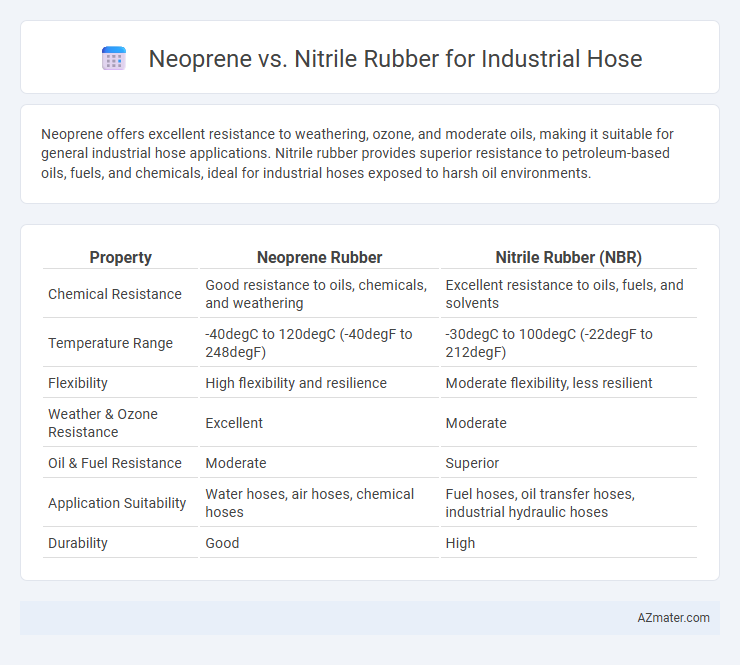Neoprene offers excellent resistance to weathering, ozone, and moderate oils, making it suitable for general industrial hose applications. Nitrile rubber provides superior resistance to petroleum-based oils, fuels, and chemicals, ideal for industrial hoses exposed to harsh oil environments.
Table of Comparison
| Property | Neoprene Rubber | Nitrile Rubber (NBR) |
|---|---|---|
| Chemical Resistance | Good resistance to oils, chemicals, and weathering | Excellent resistance to oils, fuels, and solvents |
| Temperature Range | -40degC to 120degC (-40degF to 248degF) | -30degC to 100degC (-22degF to 212degF) |
| Flexibility | High flexibility and resilience | Moderate flexibility, less resilient |
| Weather & Ozone Resistance | Excellent | Moderate |
| Oil & Fuel Resistance | Moderate | Superior |
| Application Suitability | Water hoses, air hoses, chemical hoses | Fuel hoses, oil transfer hoses, industrial hydraulic hoses |
| Durability | Good | High |
Introduction to Industrial Hose Materials
Neoprene and nitrile rubber are two common materials used in industrial hose manufacturing, each with unique chemical and physical properties ideal for specific applications. Neoprene offers excellent resistance to weathering, ozone, and moderate chemicals, making it suitable for general-purpose industrial hoses exposed to the elements. Nitrile rubber provides superior oil, fuel, and abrasion resistance, making it the preferred choice for hoses handling petroleum-based fluids and harsh industrial environments.
Overview of Neoprene Rubber
Neoprene rubber offers excellent resistance to oils, chemicals, and weathering, making it a preferred material for industrial hoses exposed to harsh environments. It provides good flexibility, durability, and moderate heat resistance, suitable for applications involving refrigerants, acids, or alkalis. Neoprene's balanced physical properties ensure reliable performance in various industrial sectors, including chemical processing, automotive, and construction.
Overview of Nitrile Rubber
Nitrile rubber is a synthetic elastomer widely used in industrial hoses for its excellent resistance to oils, fuels, and chemicals, making it ideal for harsh environments. Its high tensile strength and abrasion resistance enhance hose durability, while maintaining flexibility across a broad temperature range from -40degC to 120degC. Nitrile rubber outperforms neoprene in handling petroleum-based fluids, contributing to its preference in automotive, oil and gas, and chemical processing industries.
Chemical Resistance Comparison
Neoprene rubber offers excellent resistance to oils, acids, and alkalis, making it suitable for handling mild chemicals and petroleum-based products in industrial hoses. Nitrile rubber outperforms neoprene in resistance to fuels, mineral oils, and hydraulic fluids, providing superior durability in applications involving aggressive hydrocarbons. Selecting the appropriate material depends on the specific chemicals involved, with nitrile preferred for fuel-based exposure and neoprene favored for moderate chemical environments.
Temperature Tolerance and Stability
Neoprene offers excellent temperature tolerance ranging from -40degC to 120degC, maintaining flexibility and stability in both cold and moderately hot industrial environments. Nitrile rubber excels with a broader temperature range of -40degC to 135degC, providing superior resistance to heat and oil exposure, which enhances its stability under high-temperature conditions. Industrial hoses made from nitrile are preferred for applications requiring enhanced thermal durability and chemical resistance.
Mechanical Strength and Flexibility
Neoprene rubber exhibits superior mechanical strength with excellent resistance to abrasion, ozone, and weathering, making it ideal for industrial hoses subjected to harsh environmental conditions. Nitrile rubber offers exceptional flexibility and outstanding resistance to oils, fuels, and chemicals, ensuring durability in applications involving petroleum-based fluids. Both materials provide reliable performance, but Neoprene is preferred for mechanical robustness, while Nitrile excels in flexibility and chemical resistance.
Abrasion and Weather Resistance
Neoprene rubber offers superior abrasion resistance and excellent weather resistance, making it ideal for industrial hoses exposed to harsh environmental conditions and mechanical wear. Nitrile rubber excels in oil and chemical resistance but generally has lower abrasion resistance and can degrade faster when exposed to prolonged weathering. Choosing between Neoprene and Nitrile for industrial hoses depends on prioritizing durability against physical abrasion and outdoor exposure versus chemical compatibility and oil resistance.
Application Suitability in Industries
Neoprene rubber offers excellent resistance to weathering, ozone, and moderate chemicals, making it suitable for applications in the automotive, refrigeration, and HVAC industries. Nitrile rubber excels in oil, fuel, and chemical resistance, benefiting industries such as petroleum, automotive fuel systems, and chemical manufacturing. Industrial hoses made from nitrile are preferred for handling petroleum-based products, while neoprene hoses are widely used in general-purpose, abrasive, and outdoor applications.
Cost and Longevity Analysis
Neoprene industrial hoses typically offer moderate cost and good resistance to weathering, making them suitable for moderate longevity in diverse environments. Nitrile rubber hoses are generally more cost-effective and excel in durability, particularly against oils, fuels, and chemicals, resulting in longer service life in harsh industrial applications. Cost analysis favors nitrile for budget-sensitive projects requiring extended hose lifespan, while neoprene suits environments demanding balanced performance and moderate cost.
Choosing the Right Rubber for Your Industrial Hose
Selecting the right rubber for industrial hoses depends on chemical resistance and durability requirements, with neoprene offering excellent oil, ozone, and weather resistance, making it suitable for mild chemicals and outdoor use. Nitrile rubber excels in resisting petroleum-based fuels, oils, and solvents, providing superior abrasion resistance ideal for heavy-duty industrial applications involving hydrocarbons. Evaluating the specific operating environment and fluid compatibility is essential for maximizing hose lifespan and performance with either neoprene or nitrile materials.

Infographic: Neoprene vs Nitrile rubber for Industrial hose
 azmater.com
azmater.com